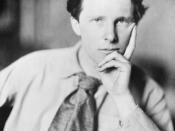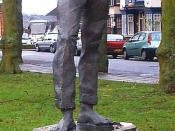War has occurred in several occasions throughout history. We've had several important wars in the twentieth century, World War I and World War II, and Vietnam. Each and every war has had an effect on those who lived through it, and those who fought in it. Poets write about what effects, and inspires them. If they were soldiers in war they often times have a strong opinion of war. This comes out in their poetry. Seigfried Sassoon, and Rupert Brooke were English poets who both served in World War I. Sassoon, a true survivor of trench warfare, wrote, "Everyone Sang" protecting war. While Brooke, who did not see the trenches, wrote, "The Soldier", and a patriotic war-supporting poem. Each man wrote a splendid war poem, but each from different spectrums of war.
"Everyone Sang" is a two stanza, five-line poem that says so much about the imprisonment of war.
The poem was written right after Sassoon's release from the British army. He is so overjoyed to be released that he compares it too, "â¦prisoned birds must find in freedom Winging wildly across the white Orchardsâ¦" Like many other poets, he is terrified by war and was "filled with such delight" to be out. Sassoon witnessed the brutality on war, which hardened him to the idea of patriotism. "Everyone Sang" is a rejoice of freedom until the final two lines. "â¦O, but everyone Was a bird; and the song was wordless; the singing will never be done." Sassoon is reflecting on the realities of war. He implies that even though he is "free" and will always be rejoicing, he will never be free from the thoughts and memories of war. Let alone the wars to come, and the new soldiers to follow in his path.
Rupert Brooke also wrote...


